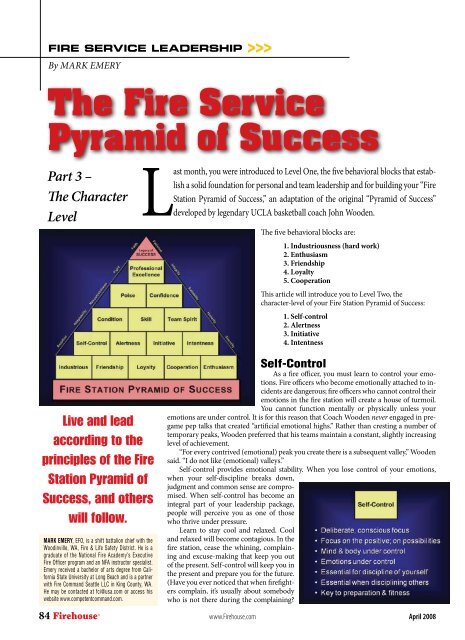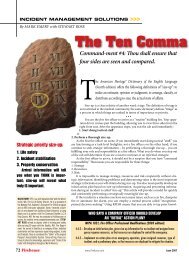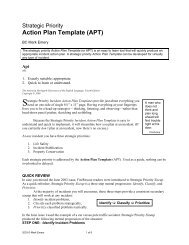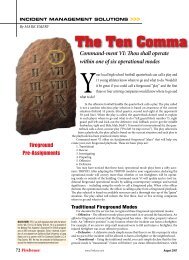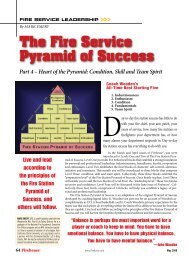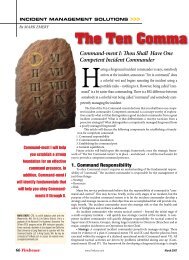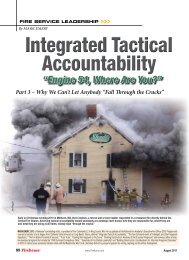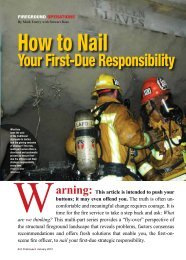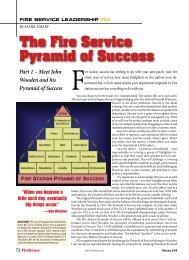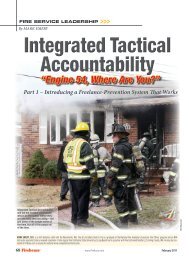The Fire Service Pyramid of Success - Part 3 - IMS Alliance
The Fire Service Pyramid of Success - Part 3 - IMS Alliance
The Fire Service Pyramid of Success - Part 3 - IMS Alliance
You also want an ePaper? Increase the reach of your titles
YUMPU automatically turns print PDFs into web optimized ePapers that Google loves.
<strong>Fire</strong> <strong>Service</strong> Leadership >>><br />
By MARK EMERY<br />
<strong>The</strong> <strong>Fire</strong> <strong>Service</strong><br />
<strong>Pyramid</strong> <strong>of</strong> <strong>Success</strong><br />
<strong>Part</strong> 3 –<br />
<strong>The</strong> Character<br />
Level<br />
Last month, you were introduced to Level One, the five behavioral blocks that establish<br />
a solid foundation for personal and team leadership and for building your “<strong>Fire</strong><br />
Station <strong>Pyramid</strong> <strong>of</strong> <strong>Success</strong>,” an adaptation <strong>of</strong> the original “<strong>Pyramid</strong> <strong>of</strong> <strong>Success</strong>”<br />
developed by legendary UCLA basketball coach John Wooden.<br />
<strong>The</strong> five behavioral blocks are:<br />
1. Industriousness (hard work)<br />
2. Enthusiasm<br />
3. Friendship<br />
4. Loyalty<br />
5. Cooperation<br />
This article will introduce you to Level Two, the<br />
character-level <strong>of</strong> your <strong>Fire</strong> Station <strong>Pyramid</strong> <strong>of</strong> <strong>Success</strong>:<br />
1. Self-control<br />
2. Alertness<br />
3. Initiative<br />
4. Intentness<br />
Live and lead<br />
according to the<br />
principles <strong>of</strong> the <strong>Fire</strong><br />
Station <strong>Pyramid</strong> <strong>of</strong><br />
<strong>Success</strong>, and others<br />
will follow.<br />
Mark Emery, EFO, is a shift battalion chief with the<br />
Woodinville, WA, <strong>Fire</strong> & Life Safety District. He is a<br />
graduate <strong>of</strong> the National <strong>Fire</strong> Academy’s Executive<br />
<strong>Fire</strong> Officer program and an NFA instructor specialist.<br />
Emery received a bachelor <strong>of</strong> arts degree from California<br />
State University at Long Beach and is a partner<br />
with <strong>Fire</strong> Command Seattle LLC in King County, WA.<br />
He may be contacted at fci@usa.com or access his<br />
website www.competentcommand.com.<br />
Self-Control<br />
As a fire <strong>of</strong>ficer, you must learn to control your emotions.<br />
<strong>Fire</strong> <strong>of</strong>ficers who become emotionally attached to incidents<br />
are dangerous; fire <strong>of</strong>ficers who cannot control their<br />
emotions in the fire station will create a house <strong>of</strong> turmoil.<br />
You cannot function mentally or physically unless your<br />
emotions are under control. It is for this reason that Coach Wooden never engaged in pregame<br />
pep talks that created “artificial emotional highs.” Rather than cresting a number <strong>of</strong><br />
temporary peaks, Wooden preferred that his teams maintain a constant, slightly increasing<br />
level <strong>of</strong> achievement.<br />
“For every contrived (emotional) peak you create there is a subsequent valley,” Wooden<br />
said. “I do not like (emotional) valleys.”<br />
Self-control provides emotional stability. When you lose control <strong>of</strong> your emotions,<br />
when your self-discipline breaks down,<br />
judgment and common sense are compromised.<br />
When self-control has become an<br />
integral part <strong>of</strong> your leadership package,<br />
people will perceive you as one <strong>of</strong> those<br />
who thrive under pressure.<br />
Learn to stay cool and relaxed. Cool<br />
and relaxed will become contagious. In the<br />
fire station, cease the whining, complaining<br />
and excuse-making that keep you out<br />
<strong>of</strong> the present. Self-control will keep you in<br />
the present and prepare you for the future.<br />
(Have you ever noticed that when firefighters<br />
complain, it’s usually about somebody<br />
who is not there during the complaining?<br />
84 <strong>Fire</strong>house ® www.<strong>Fire</strong>house.com April 2008
<strong>The</strong>y are not being industrious, they are not being loyal, they are<br />
not exhibiting self-control and thus they are not working to gain<br />
the self-satisfaction <strong>of</strong> becoming the best that they can become.)<br />
Focusing on the present will enable you to focus on future<br />
improvement, to have vision. Dwelling on the past and on others’<br />
mistakes is toxic and prevents you from doing something positive<br />
for your fire station today and in the future. Strive to maintain<br />
self-control. Be a positive influence. You will never complete your<br />
<strong>Fire</strong> Station <strong>Pyramid</strong> <strong>of</strong> <strong>Success</strong> without self-control.<br />
Nowhere is self-control more important than during the evolution<br />
<strong>of</strong> an incident. It is easy to identify firefighters and fire <strong>of</strong>ficers<br />
who have lost their self-control and have become emotionally<br />
attached to an incident – before they arrive on-scene. It is simple:<br />
Look a speed-limit sign, then glance at the apparatus speedometer.<br />
If the posted speed limit is 40 mph and the apparatus is traveling<br />
60 mph, there is (60 minus 40) 20 mph <strong>of</strong> emotional attachment.<br />
Because this driver and fire <strong>of</strong>ficer have lost their self-control, they<br />
are endangering the public and themselves. If firefighters lose their<br />
self-control while responding, imagine what will happen once they<br />
arrive on-scene: no size-up, freelancing, no command presence,<br />
random acts <strong>of</strong> tactical violence, etc.<br />
A master craftsman fire <strong>of</strong>ficer ensures that everybody amps<br />
down and belts up before the rig rolls. Self-control, along with<br />
preparation before the alarm, is essential if you hope to sniff Level<br />
Four, the leadership-level <strong>of</strong> the <strong>Pyramid</strong>: Poise and Confidence.<br />
Poise and Confidence will be supported by Level Three <strong>of</strong> the<br />
<strong>Pyramid</strong>: Condition, Skill and Team Spirit. Level Three is supported<br />
by Level Two and Level Two is supported by Level One, the<br />
foundation. (I’m not an advocate <strong>of</strong> timed turnout drills. Turnout<br />
drills encourage emotional attachment rather than foster selfcontrol.<br />
This culture <strong>of</strong> frenzy is the primary reason fire apparatus<br />
speed through intersections with occupants unbelted.)<br />
Bottom line: When you lose control <strong>of</strong> your emotions, you<br />
lose your self-control. When you lose your self-control, corners<br />
get rounded and bad things can happen. Control the adrenaline<br />
rather than allow the adrenaline to control you.<br />
Indicate 149 on Reader <strong>Service</strong> Card<br />
Alertness<br />
“<strong>The</strong>re is something going on around you at all times from<br />
which you can acquire knowledge. Too <strong>of</strong>ten, we get lost in our<br />
tunnel vision and we don’t see the things that are right in front <strong>of</strong><br />
us for the taking – for the learning.”<br />
As a fire <strong>of</strong>ficer and leader, you must constantly be alert and<br />
aware, looking for ways to improve and add value. In the fire station,<br />
“stuff ” goes on around you all the time. As you strive to<br />
achieve and maintain your personal best, alertness will make the<br />
journey much easier and more interesting. By diligently monitoring<br />
your opportunity radar, you will be quick to spot flaws and<br />
weakness and be just as quick to correct, improve and change.<br />
Indicate 150 on Reader <strong>Service</strong> Card<br />
April 2008 www.<strong>Fire</strong>house.com <strong>Fire</strong>house ® 85
fire service leadership >>><br />
“If you lose self-control, everything will fall. You<br />
cannot function physically or mentally or in any<br />
other way unless your emotions are under control.”<br />
—John Wooden<br />
Weak leaders are not alert; they have<br />
shut down their opportunity radar by burying<br />
their head in an endless tunnel <strong>of</strong> projects,<br />
paper and meetings. With head buried<br />
in an administrative bunker, you will<br />
miss opportunities to learn, improve and<br />
grow. You will miss golden opportunities<br />
for leadership. Don’t allow routine stuff<br />
to isolate you; it is impossible to lead in<br />
isolation. Occasionally, an isolated leader<br />
will pop up like an organizational sniper,<br />
squeeze-<strong>of</strong>f a couple <strong>of</strong> quasi-leadership<br />
rounds and quickly retreat to the administrative<br />
bunker. Again, Coach Wooden:<br />
“Do not mistake activity for achievement.”<br />
Stay alert as you strive to achieve personal<br />
and pr<strong>of</strong>essional excellence. Alertness<br />
is about looking for opportunities to make<br />
your small corner <strong>of</strong> the universe a better<br />
place. You must be engaged with your<br />
crew in order to diagnose what they need<br />
and want they want. Likewise, your players<br />
need to know what your expectations are.<br />
Write them down, post them conspicuously.<br />
Coach Wooden’s rules and expectations<br />
were documented and crystal clear.<br />
By coupling alertness with self-control,<br />
you can focus on opportunities and<br />
solutions that will produce desired outcomes.<br />
As a leader, it is critical to respond<br />
to setbacks and problems by quickly redirecting<br />
your focus to desired outcomes. A<br />
simple yet powerful question to ask when<br />
confronted with a problem is: “What is the<br />
true, desired outcome?” This question can<br />
be the catalyst for transforming problems<br />
into solutions – both in the fire station and<br />
on the fireground. Problem solving begins<br />
with clearly and objectively identifying the<br />
problem.<br />
Initiative<br />
Coach Wooden defines initiative as:<br />
“Having the courage to make decisions and<br />
take action when action is needed.” As a<br />
leader, you must not be afraid to fail. You<br />
are not perfect and you are going to fail at<br />
times. Liberate yourself from perfection,<br />
once you don’t have to be perfect and you<br />
know you’re going to make mistakes, do so<br />
with gusto. If you are afraid <strong>of</strong> failure – or<br />
afraid <strong>of</strong> looking bad – you will never discover<br />
what you are capable <strong>of</strong> achieving.<br />
<strong>The</strong>re is no failure worse than failure<br />
to act; failure to act is a byproduct <strong>of</strong> lack<br />
<strong>of</strong> self-control, lack <strong>of</strong> alertness and lack <strong>of</strong><br />
initiative. Fear <strong>of</strong> failure or mistakes is <strong>of</strong>ten<br />
what prevents smart, talented people from<br />
taking action and achieving the self-satisfaction<br />
<strong>of</strong> becoming the best they can. Quitting<br />
is <strong>of</strong>ten the result <strong>of</strong> a weak foundation<br />
and lack <strong>of</strong> character. Quitting is the easy<br />
road, particularly when there is someone<br />
else to use as an excuse for your retreat.<br />
Be downright scared <strong>of</strong> not being prepared<br />
to the best <strong>of</strong> your ability. You have<br />
vanquished fear when you have a strong<br />
desire to be your best. Learn from failure<br />
and mistakes; never miss an opportunity<br />
to learn. Focusing on elaborate excuses and<br />
rooting out and focusing on who is to blame<br />
will bring nothing <strong>of</strong> lasting value. Unfortunately,<br />
such an atmosphere will foster fear<br />
<strong>of</strong> failure, lack <strong>of</strong> action and fault finding –<br />
at the expense <strong>of</strong> learning, growth and improvement.<br />
(Raise your hand if you want<br />
to be the next person raked over the coals<br />
when you’re not present?) In my experience<br />
firefighters criticize inaction harsher<br />
than they criticize mistakes.<br />
Being a fire <strong>of</strong>ficer is about being<br />
what I call a “heroic leader.” You become<br />
a heroic leader when you throw every<br />
ounce <strong>of</strong> your heart and soul into making<br />
a positive difference for someone<br />
else. Initiative, along with a solid <strong>Pyramid</strong><br />
foundation, is the key to leading heroically.<br />
A heroic leader has the courage<br />
to act alone and to make decisions.<br />
One <strong>of</strong> the most valuable ways to<br />
exercise your initiative is to acknowledge<br />
and recognize initiative in others. Instead<br />
<strong>of</strong> feeling taken for granted, your firefighters<br />
must know they are truly important,<br />
appreciated and a valued member <strong>of</strong> the<br />
team. I agree with Coach Wooden that the<br />
team that makes the most mistakes usually<br />
wins. Being overly cautious and tentative<br />
will produce inaction. Hesitate and before<br />
you know it you’re down by 20 points.<br />
Intentness<br />
Coach Wooden’s definition <strong>of</strong> intentness<br />
is simple yet powerful: Intentness is<br />
the ability to resist temptation and stay the<br />
course, to concentrate on your objective<br />
with determination and resolve. Impatience<br />
is wanting too much too soon. Intentness<br />
doesn’t involve wanting something, intentness<br />
involves doing something.<br />
“When you lose control <strong>of</strong> your emotions, when<br />
your self-discipline breaks down, your judgment<br />
and common sense suffer. How can you perform<br />
at your best when you are using poor judgment?”<br />
—John Wooden<br />
86 <strong>Fire</strong>house ® www.<strong>Fire</strong>house.com April 2008
fire service leadership<br />
Your pr<strong>of</strong>essional excellence journey<br />
will take time – a long time. I’ll admit it<br />
sounds corny, but it’s true, success is a<br />
journey not a destination. It took Coach<br />
Wooden 14 years to develop the <strong>Pyramid</strong><br />
<strong>of</strong> <strong>Success</strong>. It was another 15 years before<br />
UCLA won the first <strong>of</strong> its 10 national<br />
championships. Wooden’s patient 29-year<br />
journey produced the greatest NCAA<br />
“Ability will get you to<br />
the top, character will<br />
keep you there.”<br />
—John Wooden<br />
basketball record in history. (UCLA<br />
won its first NCAA championship with<br />
a team that had no player taller than<br />
6-foot-5! Before the season started,<br />
sports journalists and basketball “experts”<br />
dismissed UCLA as a championship<br />
contender; they believed that no<br />
team <strong>of</strong> such short stature could possibly<br />
win an NCAA championship.)<br />
After winning their first national<br />
championship, Wooden’s UCLA teams<br />
compiled the most amazing run <strong>of</strong> championship<br />
performances in NCAA history.<br />
<strong>The</strong> “Wizard <strong>of</strong> Westwood” was the model<br />
<strong>of</strong> intentness.<br />
Once you have determined your vision<br />
and established goals for yourself,<br />
your crew and for your fire station, stay the<br />
course. <strong>The</strong>re will be setbacks. You may<br />
have to change your methods. You may<br />
have to go around, under or over. You may<br />
have to return to the drawing board and<br />
start over. Adapt and adjust; don’t fight it.<br />
Do what you’ve got to do, but you do not<br />
quit. Just remember not to project fault on<br />
other people – instead focus on learning,<br />
adapting, and moving forward.<br />
Coach Wooden told his players: “Be<br />
persistent. Be determined. Be tenacious.<br />
Be completely determined to reach your<br />
goal.” My friend, that is intentness.<br />
F. E. A. R.<br />
Familiarization. Education. Application.<br />
Repeat.<br />
My personal model for implementing<br />
this level <strong>of</strong> the <strong>Pyramid</strong> is the acronym<br />
F.E.A.R.:<br />
• Familiarization examples include<br />
pre-plan familiarization tours (access<br />
problems, fire load problems, evacuation<br />
and exposure challenges, etc.), ensuring<br />
Indicate 151 on Reader <strong>Service</strong> Card<br />
April 2008 www.<strong>Fire</strong>house.com <strong>Fire</strong>house ® 87
fire service leadership


